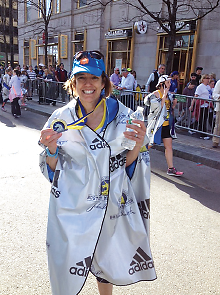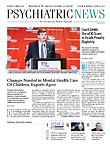At mile 20 of this year’s Boston Marathon, just before Heartbreak Hill, psychiatrist Nancy Rappaport, M.D., paused to ask a spectator to repin her nametag higher on her chest.
“I wanted my name to be easy to see,” Rappaport told Psychiatric News. “Hearing ‘Go, Nancy,’ and other cheering helped me keep moving.”
An associate professor of psychiatry at Harvard Medical School, Rappaport, 54, completed the 26.2 mile run—her 11th Boston Marathon—in 4 hours, 52 minutes, 53 seconds.
She was among 31,931 runners and 53 wheelchair participants who finished this year’s race. An estimated 1 million people lined Boston’s streets to watch it, double the usual turnout.
“This year’s marathon was all about endurance,” Rappaport said. “It reflected the community’s determination not to be defined by last year’s tragedy.”
Three people were killed, and 264 were injured, including 16 who lost limbs, when two bombs were detonated near the finish line of last year’s race.
While Rappaport did not run last year—she was at home studying for her recertification exam in child psychiatry—her daughter Zoe was among spectators near the finish line.
“When a friend called to tell me about the bombs, I was frantic,” she recalled. “At first, I couldn’t remember my daughter’s cell phone number. Then cell phones weren’t working. I finally reached one of her friends and learned Zoe was safe.”
Rappaport also soon learned the alleged bombers, Tamerlan Tsarnaev, who was killed in a shootout with police, and Dzhokhar Tsarnaev, whose trial is scheduled for November, were recent graduates of Cambridge Rindge and Latin High School, where she has worked for more than 20 years as an attending child psychiatrist. She also directs school-based mental health programs at Cambridge Health Alliance.
Rappaport met with the Cambridge Public Schools’ superintendent, principal, and director of safety and security before the first school day after the bombings, and later met with school social workers, teachers, students, and parents. The son and daughter-in-law of retired school staff members lost limbs in the bombings. Over the past year, “one of my most professionally challenging times,” she said, she has been coordinating clinician support for the schools.
Lawrence Abrams, Ph.D., a staff psychologist and director of psychology training at the Brookline Community Mental Health Center (CMHC), had an experience at last year’s marathon similar to Rappaport’s. His son Jake was among the runners.
Watching the race at mile 23, the Brookline CMHC’s location, Abrams and his wife learned about the bombs when their daughter called from Philadelphia to ask if Jake was OK. “We couldn’t reach him on his cell phone,” Abrams recalled. After an anxiety-filled 45 minutes, they learned Jake had crossed the finish line before the bombs went off and left the area.
This year, Abrams, a runner himself, served as mental health coach for the 42-member Brookline running team, whose members raised funds for four Brookline nonprofits, including the CMHC.
Ten team members ran in last year’s marathon, but because of the bombings, eight had to stop before reaching the finish line. None was physically injured.
Some voiced feelings of anxiety, Abrams said, not typical pre-race jitters, but concerns about safety. Some wondered if it was all right to have positive feelings about participating.
I told them the anniversary of a trauma often stirs up event-related feelings, images, and bodily sensations, he said, and that such experiences are both normal and different for each person. To reduce media retraumatization, he encouraged runners to turn off TVs and radios.
Running can help burn off anxiety, he noted. Conversely, he said, runners tend to be resilient, counterdependent, and used to running through pain.
“Plowing through is useful if you’re running a marathon,” Abrams noted. “But people process trauma better by sharing it with people they trust, those from whom they are most likely to get a validating and comforting response.”
Returning to routines helps people process trauma, Rappaport agreed. “We can never forget those who were killed or injured,” she said, “but this year’s marathon helped Bostonians regain their balance. It’s a spring day, Patriot’s Day, and participating in the marathon is what Bostonians do.
“This is our race again,” she said. “We took it back.” ■

